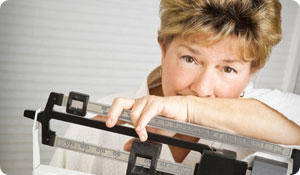
Millions of women are undiagnosed with an extremely common mood disorder, called the Body Blues. Instead of showing up as sadness or depression, Body Blues shows up as weight gain, fatigue, and a low sex drive (among other symptoms). What's going on and what can you do about the Body Blues?
Marie-Annette Brown, PhD, ARNP, RN, FAAN is a Professor of Nursing at University of Washington and a nationally certified family and psychiatric/mental health nurse practitioner at the University of Washington Women's Health Care Clinic. She's also the co-author (with Jo Robinson) of When Your Body Gets the Blues. Brown describes the Body Blues as a type of mild depression, not a severe mood disorder, that is especially common in women. Women affected by this condition feel tired, tense and irritable and a lack of energy and motivation, especially in the second half of their day. They have food cravings that tend to cause them to be overweight. They feel unhealthy, unsexy, unattractive and more. Brown says the most common symptoms of Body Blues are:
- Low energy
- Overeating
- Weight gain
- Tension and Irritability
- Sleep difficulties
- Difficulty concentrating
- Mild anxiety
- Mild depression
- Decreased interest in sex
While almost anyone can feel at least some of these symptoms, people with Body Blues feel at least three of them most of the time to the point where they adversely affect their lifestyle and self-esteem.
What Causes Body Blues?
Dr. Brown and other physicians believe Body Blues are caused by two main causes:
- Decreased and fluctuating hormone levels and
- Light deprivation
The Hormone Factor
Estrogen levels drop off at the end of the menstrual cycle, after having a baby, when breastfeeding, during perimenopause, and after menopause. Estrogen plays a big role in serotonin production. Serotonin activity is linked to mood, appetite control, physical energy, and ability to withstand stress. Decreased estrogen means less serotonin activity and therefore, adversely affects mood, energy, and appetite control.
Progesterone plays a role in women's ability to rest and deal with stress, so, when progesterone levels drop (for all the same reasons that cause estrogen reduction), women feel more irritable, tense, and tired.
Testosterone (present in men and women) plays an important role in our sex drive. Reduced testosterone levels make women less interested in sex and may also increase fatigue and anxiety.
The Light Factor
Brown says that Body Blues can be caused by light deprivation from living in areas that don't get much sunshine and spending too much time indoors. The more time you spend in low light conditions, the more likely you are to feel tired, eat too much, gain weight, and feel too exhausted to exercise.
What's the Cure for the Body Blues?
Brown says relieving the Body Blues is as simple as 1,2, 3. She's designed The Levity Program based on three activities:
1) Create more bright and natural light in your environment during the day and less light at night.
2) Take a brisk 20-minute outdoor walk, five or more times per week
3) Take 50 mgs each of vitamins B-1, B-2, B-6; 400 mcg. Folic acid; 400 IU of vitamin D; and 200 mcg. Selenium.
Does The Levity Program work? Participants in an 8-week study found The Levity Program to be very effective and easy. Most experienced improved mood, energy and sleep, and less anxiety, depression and irritability. Physicians and health experts often prescribe walking, light therapy, and a good multivitamin as a common sense way to improve overall health. If it also cures the Body Blues, there's certainly nothing to lose by trying.
Sources:
Women & Health, Vol. 34(3) 2001
"The Effects of a Multi-Modal Intervention Trial of Light, Exercise, and Vitamins on Women's Mood"
Marie-Annette Brown, PhD, FNP, FAAN
Jamie Goldstein-Shirley, MSN, RN
Jo Robinson
Susan Casey, PhC, MN, RN
http://www.informaworld.com/smpp/content~db=all~content=a904536665~frm=titlelink





